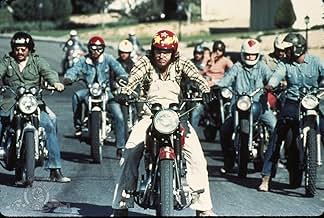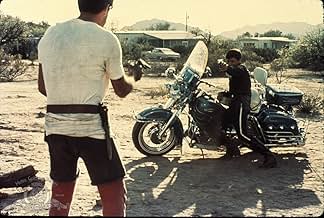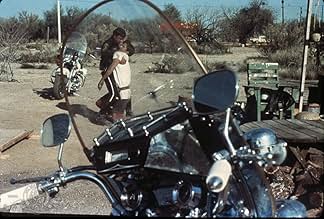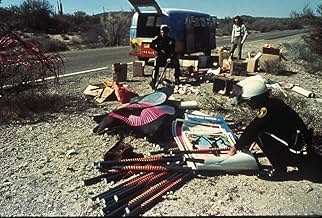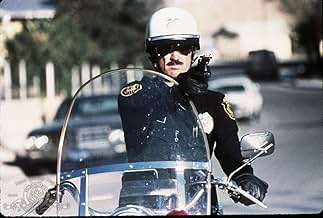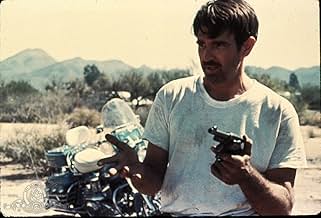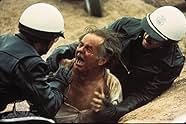Electra Glide in Blue
- 1973
- Tous publics
- 1h 54min
NOTE IMDb
7,0/10
6,9 k
MA NOTE
John Wintergreen, un motard ambitieux mais de petite taille, patrouille sur les routes de l'Arizona, aspirant à une promotion au poste d'inspecteur de la criminelle, tout en enquêtant sur un... Tout lireJohn Wintergreen, un motard ambitieux mais de petite taille, patrouille sur les routes de l'Arizona, aspirant à une promotion au poste d'inspecteur de la criminelle, tout en enquêtant sur un meurtre lié aux hippies.John Wintergreen, un motard ambitieux mais de petite taille, patrouille sur les routes de l'Arizona, aspirant à une promotion au poste d'inspecteur de la criminelle, tout en enquêtant sur un meurtre lié aux hippies.
- Réalisation
- Scénario
- Casting principal
- Récompenses
- 3 nominations au total
Billy Green Bush
- Zipper
- (as Billy 'Green' Bush)
Elisha Cook Jr.
- Willie
- (as Elisha Cook)
Hawk Wolinski
- VW Bus Driver
- (as David J. Wolinski)
Melissa Greene
- Zemko's Girlfriend
- (as Melissa Green)
Avis à la une
Much chat about this film, especially now since it's 'finally' out on DVD in wide screen format.
This is the best film of a specialized genre from the late 60's through early 1970's exploring the counter-culture revolution and the "Establishment".
Unlike Easy Rider, A Clockwork Orange and Billy Jack, EGIB hits the nail on the head. There is evil everywhere, and good intentions don't always result in good outcomes.
Beautiful directorial debut by Guercio, awesome cinematography by Conrad Hall.
In essence, one of the best films from 1973.
This is the best film of a specialized genre from the late 60's through early 1970's exploring the counter-culture revolution and the "Establishment".
Unlike Easy Rider, A Clockwork Orange and Billy Jack, EGIB hits the nail on the head. There is evil everywhere, and good intentions don't always result in good outcomes.
Beautiful directorial debut by Guercio, awesome cinematography by Conrad Hall.
In essence, one of the best films from 1973.
A requiem for the death of the American hero. No, this is not the plot--this is what the movie accomplishes. Do not mistake this existential parable for what may otherwise seem like a superficial counter culture exploitation flick--it is nothing of the sort.
Record producer Guercio's first (and last) effort at filmmaking (captured beautifully by the late cinematographer Conrad Hall) leaves the viewer wondering "where have all the cowboys gone?" John Ford taught us that the hero rode a white horse and did the right thing, even if it killed him-, and in this Vietnam era analogue, Blake is a five foot four inch leather clad motorcycle cop writing speeding tickets along a lonely two lane road cutting through monument valley. With high hopes and ideals, he aspires not only to do more but to become more...and for a while he succeeds. But the world is different, people are different, and the old heroes he admired are not just obsolete--they are extinct.
We are inexorably drawn through his disillusionment and our own to an ending that is sad, tragic, and inevitable.
Record producer Guercio's first (and last) effort at filmmaking (captured beautifully by the late cinematographer Conrad Hall) leaves the viewer wondering "where have all the cowboys gone?" John Ford taught us that the hero rode a white horse and did the right thing, even if it killed him-, and in this Vietnam era analogue, Blake is a five foot four inch leather clad motorcycle cop writing speeding tickets along a lonely two lane road cutting through monument valley. With high hopes and ideals, he aspires not only to do more but to become more...and for a while he succeeds. But the world is different, people are different, and the old heroes he admired are not just obsolete--they are extinct.
We are inexorably drawn through his disillusionment and our own to an ending that is sad, tragic, and inevitable.
An incredible piece of film making, this beautifully shot movie really is about as poetic as it's possible for cinema to be and still have a coherent, gripping narrative. It feels like a western with its dramatic monument valley backdrop and masculine themes, but plays more like a European movie, with it's dark characterisations and existential mood . The soundtrack is fantastic and the feeling the movie imparts is unique. I always recommend this film to people because so few have ever seen it. I think it's a tragedy that James Guercio didn't make more movies because this was his first (and only) film and it's up there with the best of Peckinpah/Leone/Boorman/Seigal (whose work is similar). I'll never forget this film and the ending will live with me forever. If you like movies you need to see this film, This is real Cinema.
Robert Blake has one of the best roles of his career as John Wintergreen, a dedicated motorcycle cop who yearns for more in life. What he'd really like is to be a detective - to wear a suit, a Stetson, and "get paid to think". He gets his chance when he discovers what first appears to be a suicide, but which John determines had to have been a murder. When John shows that he's got what it takes for the detective business, a charismatic hotshot named Harve Poole (Mitch Ryan) takes him under his wing, hiring John as a driver. What happens is that John becomes quite disillusioned watching Harve at work. John strives to be a good, kind, honest man, and doesn't like Harves' approach to law enforcement. A revelation regarding his colleague and good friend "Zipper" (Billy Green Bush) only adds to his dismay.
"Electra Glide in Blue" marked the filmmaking debut for James William Guercio, a veteran of the music industry who, with the help of ace cinematographer Conrad Hall, brings a lot of visual poetry which is not the action-packed murder mystery that some viewers might expect, or hope, it to be. That aspect of this film is never heavily stressed, as the movie clearly functions much more as a series of character vignettes. It's got a very deliberate pace to it, as it gives a number of its major players opportunities to tear into some meaty roles. Blake and Bush have fine chemistry and are quite engaging; you believe them as buddies. Ryan commands the screen whenever he's around; he's an excellent character actor (whom you may know best as the villain in "Lethal Weapon") who gives his role some real nuance. Royal Dano is a little under utilized as a grumpy coroner with whom John butts heads, but Jeannine Riley is wonderful as the barmaid Jolene, and Elisha Cook Jr. is as delightful as ever in the role of sad old sack Willie. Considering Guercios' background, it's not a surprise that some of the supporting players come from the music business - screenwriter Hawk Wolinski as the van driving hippie, and Peter Cetera and Terry Kath from the band Chicago; Cetera, amusingly, plays a scruffy biker. Keep a sharp eye out for Nick Nolte, uncredited as an extra in the commune scene.
The film turns out to be a moving meditation on personal ideals and loneliness, and leads to a shattering conclusion. This conclusion is much in line with films of this time period, and takes its time to play out. It's the kind of thing you don't easily forget.
It's not hard to see why this would have a following. It's interesting and it's entertaining, and well worth a look.
Seven out of 10.
"Electra Glide in Blue" marked the filmmaking debut for James William Guercio, a veteran of the music industry who, with the help of ace cinematographer Conrad Hall, brings a lot of visual poetry which is not the action-packed murder mystery that some viewers might expect, or hope, it to be. That aspect of this film is never heavily stressed, as the movie clearly functions much more as a series of character vignettes. It's got a very deliberate pace to it, as it gives a number of its major players opportunities to tear into some meaty roles. Blake and Bush have fine chemistry and are quite engaging; you believe them as buddies. Ryan commands the screen whenever he's around; he's an excellent character actor (whom you may know best as the villain in "Lethal Weapon") who gives his role some real nuance. Royal Dano is a little under utilized as a grumpy coroner with whom John butts heads, but Jeannine Riley is wonderful as the barmaid Jolene, and Elisha Cook Jr. is as delightful as ever in the role of sad old sack Willie. Considering Guercios' background, it's not a surprise that some of the supporting players come from the music business - screenwriter Hawk Wolinski as the van driving hippie, and Peter Cetera and Terry Kath from the band Chicago; Cetera, amusingly, plays a scruffy biker. Keep a sharp eye out for Nick Nolte, uncredited as an extra in the commune scene.
The film turns out to be a moving meditation on personal ideals and loneliness, and leads to a shattering conclusion. This conclusion is much in line with films of this time period, and takes its time to play out. It's the kind of thing you don't easily forget.
It's not hard to see why this would have a following. It's interesting and it's entertaining, and well worth a look.
Seven out of 10.
Pigs! Killers! Fascists! Anti-cop? Not a chance. The locals took one peek at the script and threw the entire film crew out of their precinct, and escorted them to the edge of town and beyond. Wow! Sharp bikes. And movie title. Robert Blake is dead on right as the highway cop. He makes up for in height by what he delivers in toughness and compassion. Miss Jeannie Riley plays the love interest of both Blake and his superior. She has a lengthy bar room scene bordering on religious fervor and regret. Nifty character turns by veterans Elisha Cook Jr. and Royal Dano. The action sequences are staged and edited with flair. The great cameraman, Conrad T. Hall, experimented with the interiors, flooding the camera lens with smoke, diffused light and warped, fun house-type angles. Memorable moments one and two: Blake has two great dress-up scenes. The first involves his uniform and motorcycle. The second concerns his new threads when he makes detective. An old do-wop group, The Marcels, invades the soundtrack with the flip side of "Blue Moon." However, the best musical cue occurs at the end of the film. The closing song, "Tell me," written by the producer/director/composer, James W. Guercio, of this film, is a masterpiece of the rock genre. Worthy of an Oscar or Grammy, the song begins with a nod to Blood, Sweat and Tears, travels to Chicago and, later, dismounts in Spectorville. A road and a movie well traveled. And taken
Le saviez-vous
- AnecdotesFirst-time director James William Guercio wanted Conrad L. Hall to photograph this film, but Hall's salary was more than was budgeted for a cinematographer. Guercio reduced his own salary to $1.00 so he could secure Hall as the cinematographer.
- GaffesIn the final driving scenes, the van and the bike, supposedly driving along a long straight road, drive by the same distant butte at least three times.
- Citations
Harve Poole: Incompetence is the worst form of corruption.
- Versions alternativesJohn Wintergreen is called John Winterberg in the German version.
- ConnexionsEdited into The Our Gang Story (1994)
Meilleurs choix
Connectez-vous pour évaluer et suivre la liste de favoris afin de recevoir des recommandations personnalisées
- How long is Electra Glide in Blue?Alimenté par Alexa
Détails
Box-office
- Montant brut aux États-Unis et au Canada
- 1 600 000 $US
- Durée
- 1h 54min(114 min)
- Couleur
- Mixage
- Rapport de forme
- 2.39 : 1
Contribuer à cette page
Suggérer une modification ou ajouter du contenu manquant


